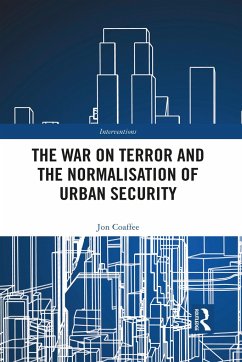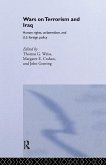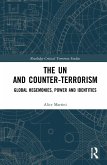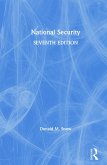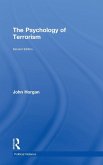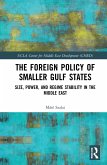Pete Fussey, Professor of Criminology, University of Essex, UK.
Tracing and drawing together the precursors of contemporary approaches to urban security, Jon Coaffee offers an authoritative account of how the city irrevocably changed as a result of the mundane and exceptional measures introduced as a result of the U.S-led War on terror. Building on Professor Coaffee's longstanding engagement with the field and marshalling and interrogating an unparalleled range of empirical studies and interdisciplinary insights from both before and since 9/11, this important book showcases how national governments, city administrations, technology companies, the military, policing and intelligence agencies, and the citizenry have become increasingly implicated into countering the enduring threat of urban terrorism. Informed by a range of critical social theory, this account further addresses important questions concerning the intensification of social control and surveillance, and the reshaping of civic responsibility. At the same time, this unique analysis illuminates how ideas of militarism, preparedness, pre-emption and resilience have become institutionalised within systems of security governance and emerged as an integral part of normal everyday city life.
Nick Vaughan-Williams, Professor of International Security and Interventions book series editor, University of Warwick, UK.
Jon Coaffee's most recent book is a timely and welcome addition to the Interventions book series. In this groundbreaking text, many of the conventions of IR and global politics are critically challenged as post-9/11 counter-terrorism interventions are interrogated and their implications for everyday life detailed. In this synthesis of critical theory and an understanding of security practices and behaviours across an ever expanding range of security actors and civil society, a greater focus is placed upon better understanding the role of security's many audiences than in traditional scholarship. The result is a detailed rendering of the rescaling and refocusing of security concerns to the metropolitan level and below as a result of anxieties about 'new terrorism' and the purported need to enhance resilience. Whether this is through concerns for the protection of vulnerable crowded locations, the 'lockdown' security that has become an accepted part of staging high-profile events, attempts to counter the radicalisation and violent extremism of individuals and certain communities, the impact of state-level threats assessments and public warning and informing campaigns, or the overlap between counter-terrorism and pandemic response practices, this book provides a grounded account of the importance of understanding how 'spaces of security' have been steadily intensified over recent decades, and the wider implications of this 'new normal' for the securitisation of everyday life.
Tracing and drawing together the precursors of contemporary approaches to urban security, Jon Coaffee offers an authoritative account of how the city irrevocably changed as a result of the mundane and exceptional measures introduced as a result of the U.S-led War on terror. Building on Professor Coaffee's longstanding engagement with the field and marshalling and interrogating an unparalleled range of empirical studies and interdisciplinary insights from both before and since 9/11, this important book showcases how national governments, city administrations, technology companies, the military, policing and intelligence agencies, and the citizenry have become increasingly implicated into countering the enduring threat of urban terrorism. Informed by a range of critical social theory, this account further addresses important questions concerning the intensification of social control and surveillance, and the reshaping of civic responsibility. At the same time, this unique analysis illuminates how ideas of militarism, preparedness, pre-emption and resilience have become institutionalised within systems of security governance and emerged as an integral part of normal everyday city life.
Nick Vaughan-Williams, Professor of International Security and Interventions book series editor, University of Warwick, UK.
Jon Coaffee's most recent book is a timely and welcome addition to the Interventions book series. In this groundbreaking text, many of the conventions of IR and global politics are critically challenged as post-9/11 counter-terrorism interventions are interrogated and their implications for everyday life detailed. In this synthesis of critical theory and an understanding of security practices and behaviours across an ever expanding range of security actors and civil society, a greater focus is placed upon better understanding the role of security's many audiences than in traditional scholarship. The result is a detailed rendering of the rescaling and refocusing of security concerns to the metropolitan level and below as a result of anxieties about 'new terrorism' and the purported need to enhance resilience. Whether this is through concerns for the protection of vulnerable crowded locations, the 'lockdown' security that has become an accepted part of staging high-profile events, attempts to counter the radicalisation and violent extremism of individuals and certain communities, the impact of state-level threats assessments and public warning and informing campaigns, or the overlap between counter-terrorism and pandemic response practices, this book provides a grounded account of the importance of understanding how 'spaces of security' have been steadily intensified over recent decades, and the wider implications of this 'new normal' for the securitisation of everyday life.

